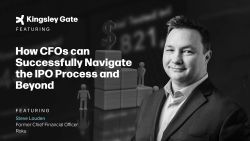
How CFOs Can Successfully
Navigate the IPO Process and Beyond
Navigate the IPO Process and Beyond
In today’s rapidly evolving business landscape, companies are increasingly considering the benefits of going public. An initial public offering (IPO) can provide capital for private companies looking to grow while providing much-needed liquidity to investors and employees.
However, the IPO process can be complex and challenging as evidenced by the sharp downturn in completed listings in 2023 compared to previous years.
In this article, we will dive into Roku’s highly successful IPO and Former CFO Steve Louden’s journey at the helm. With Steve as our expert guide, we summarize pragmatic and valuable lessons for leadership teams and Boards with plans to go public in the coming year(s).


The Growing Demand for IPOs
As summarized by EY in its Global IPO Trends 2023 report, CE0s retain appetite for IPOs as they look to the window opening in 2024.
On a global basis, smaller IPOs have delivered better after-market returns to public investors than larger ones, signaling a potential shift whereby private companies go public sooner in their growth curve. Adding to the pipeline of deals is private equity’s desire to return cash to LP investors, fund new investments, and raise new pools of capital.
CFO's Role in Preparing for an IPO
The CFO plays a crucial role in the IPO process, both in terms of securing capital and managing the business as a public company. When Steve led Roku through its IPO in 2017, Roku faced the challenges of transforming from a hardware-focused company to a streaming platform with advertising and hardware revenue streams.
To ensure a successful transition to a public company, Steve focused on elevating the necessary capabilities in the organization to improve business partnering and accountability. This included establishing a rigorous financial close process, enhancing financial forecasting, and developing a strong relationship with key advisors, such as bankers, lawyers, and accountants.
According to Steve, private companies should consider “acting like a public company” a year or so before a targeted IPO by investing in people, processes, and systems that enable the organization to perform mock earnings calls, develop investor relations scripts, and prepare for the more consistent and intense financial reporting requirements of public companies.
Balancing Rigor and Flexibility as a CFO
Throughout his IPO journey, Steve learned valuable lessons that apply not only to CFOs but all business leaders. One of the most critical lessons is the importance of balancing rigor and flexibility in decision making. Steve emphasizes the need for CFOs to provide business insights that are relevant and digestible to their stakeholders, offering a unique perspective on the company's financial health and strategic direction.
Another crucial lesson is the recognition that successful IPOs require strong relationships with business partners and stakeholders. By building credibility and trust ahead of time, CFOs can navigate challenging discussions, such as cost-cutting or underperformance, with greater understanding and cooperation. From Roku’s IPO at $1.3Bn in 2017 to a pandemic peak of north of $60Bn, and then more recently a correction Steve preaches the importance of “level-headed” leadership as CFO. One aspect of that is encouraging your team and employee base to accept stock price volatility and “ground oneself” in what the company and one can do to improve business performance.
Keeping Up with Volatility and Making Tough Decisions
CFOs face the challenge of managing volatility and making difficult decisions during periods of uncertainty. This requires maintaining consistency in communication with internal stakeholders, such as employees and business partners, and setting realistic expectations about performance during both highs and lows. Stabilizing fears and providing a clear roadmap towards recovery is crucial in regaining market confidence and ensuring long-term success.
In times of crisis, CFOs must balance their role as financial stewards with their responsibility to support the company's growth. This may involve revising cost structures, making tough decisions related to layoffs or shelving projects, and demonstrating agility in adapting to changing market conditions.
This balancing act is particularly critical in the context of managing investor expectations and the CFO's responsibilities during IPO, where their decisions and communication strategies can significantly impact post-IPO success. By effectively navigating these challenges, CFOs play a pivotal role in steering the company through turbulent times and positioning it for sustainable growth.
The Role of AI in Finance
Looking ahead, the role of AI in finance is becoming increasingly relevant. While caution is necessary due to potential risks, incorporating AI into finance processes can lead to improved efficiency and decision-making. Steve highlights the importance of utilizing AI to provide business insights and optimize financial operations while ensuring the proper controls and governance are in place.
By leveraging AI effectively, CFOs can not only streamline their financial functions but also enhance their ability to deliver valuable insights and support strategic decision-making within their organizations. Boards are increasingly asking CFOs (and CEOs) how they intend to incorporate AI into their day-to-day operations to increase shareholder value.
This is particularly pertinent in areas such as financial modeling for IPO, post-IPO financial reporting, and equity financing, where AI can revolutionize traditional approaches, offering greater accuracy, speed, and depth of analysis.
The Journey Continues: CFOs as A Board Candidate
After his successful tenure as a CFO, Steve has transitioned to serving as a professional board member on two public companies. As a former CFO, Steve brings his financial expertise to the boardroom, offering valuable insights and guidance on financial matters.
However, Steve emphasizes the importance of taking a holistic approach as a board member, not merely focusing on financial aspects. By understanding the business and building relationships with other board members, Steve demonstrates the value of a strategic mindset and the ability to contribute to business discussions beyond the finance function.




